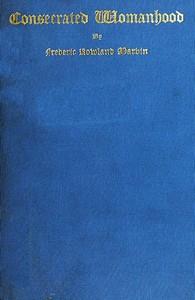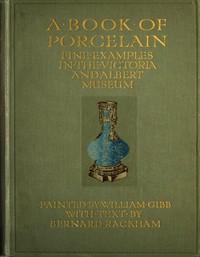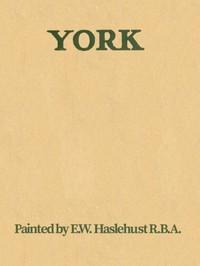Read this ebook for free! No credit card needed, absolutely nothing to pay.
Words: 25754 in 9 pages
This is an ebook sharing website. You can read the uploaded ebooks for free here. No credit cards needed, nothing to pay. If you want to own a digital copy of the ebook, or want to read offline with your favorite ebook-reader, then you can choose to buy and download the ebook.
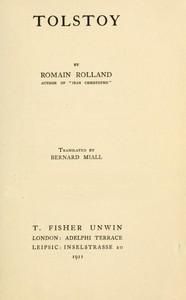

: Tolstoy by Rolland Romain Miall Bernard Translator - Tolstoy Leo graf 1828-1910; Novelists Russian 19th century Biography
subjects "when compared with ancient models, such as the sublime history of Joseph." The excessive minuteness of detail is detrimental to such works, which for that reason cannot become universal.
"Modern works of art are spoiled by a realism which might more justly be called the provincialism of art."
Thus Tolstoy unhesitatingly condemns the principle of his own genius. What does it signify to him that he should sacrifice himself to the future--and that nothing of his work should remain?
"The art of the future will not be a development of the art of the present: it will be founded upon other bases. It will no longer be the property of a caste. Art is not a trade or profession: it is the expression of real feelings. Now the artist can only experience real feelings when he refrains from isolating himself; when he lives the life natural to man. For this reason the man who is sheltered from life is in the worst possible conditions for creative work."
In the future "artists will all be endowed." Artistic activity will be made accessible to all "by the introduction into the elementary schools of instruction in music and painting, which will be taught to the child simultaneously with the first principles of grammar." For the rest, art will no longer call for a complicated technique, as at present; it will move in the direction of simplicity, clearness, and conciseness, which are the marks of sane and classic art, and of Homeric art. How pleasant it will be to translate universal sentiments into the pure lives of this art of the future! To write a tale or a song, to design a picture for millions of beings, is a matter of much greater importance--and of much greater difficulty--than writing a novel or a symphony. It is an immense and almost virgin province. Thanks to such works men will learn to appreciate the happiness of brotherly union.
"Art must suppress violence, and only art can do so. Its mission is to bring about the Kingdom of God, that is to say, of Love."
Which of us would not endorse these generous words? And who can fail to see that Tolstoy's conception is fundamentally fruitful and vital, in spite of its Utopianism and a touch of puerility? It is true that our art as a whole is only the expression of a caste, which is itself subdivided not only by the fact of nationality, but in each country also into narrow and hostile clans. There is not a single artist in Europe who realises in his own personality the union of parties and of races. The most universal mind of our time was that of Tolstoy himself. In him men of all nations and all classes have attained fraternity; and those who have tasted the virile joy of this capacious love can no longer be satisfied by the shreds and fragments of the vast human soul which are offered by the art of the European cliques.
In time he even came to justify suffering--not only personal suffering, but the sufferings of others. "For the assuagement of the sufferings of others is the essence of the rational life. How then should the object of labour be an object of suffering for the labourer? It is as though the labourer were to say that an untilled field is a grief to him."
For that matter, he wished to leave before the end of the first act. "For me the question was settled. I had no more doubt. There was nothing to be expected of an author capable of imagining scenes like these. One could affirm beforehand that he could never write anything that was not evil."
In order to make a selection from the French poets of the new schools he conceived the admirable idea of "copying, in each volume, the verses printed on page 28!"
"Here was one of those incidents which often occur, without attracting the attention of any one, and without interesting--I do not say the world--but even the French military world." And further on: "It was not until some years had passed that men awoke from their hypnosis, and understood that they could not possibly know whether Dreyfus were guilty or not, and that each of them had other interests more important and more immediate than the Affaire Dreyfus."
The only character of Shakespeare's whom he finds natural is Falstaff, "precisely because here the tongue of Shakespeare, full of frigid pleasantries and inept puns, is in harmony with the false, vain, debauched character of this repulsive drunkard."
Free books android app tbrJar TBR JAR Read Free books online gutenberg
More posts by @FreeBooks
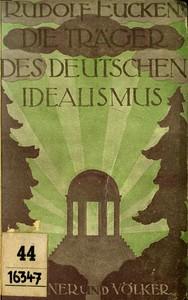

: Consecrated Womanhood A Sermon Preached in the First Congregational Church Portland Oregon by Marvin Frederic Rowland Cobbe Frances Power Author Of Introduction Etc - Sermons American; Women in the Bible; Women Biblical teaching
